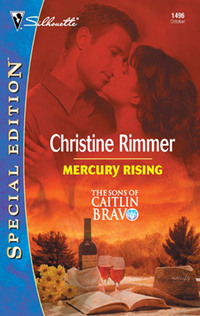
Полная версия
The Marriage Agreement

“I’m offering you what you said you wanted.”
“You’re a few years too late, and that situation was nothing like this one.”
“No, it wasn’t. Now I have a life to offer you. Now we have a daughter together. Now we just might have another—”
“I think we need to stop talking about what might be and think about what is.”
Marsh leaned in on her again, so close that Tory felt his warm breath on her face, so close that the pull of attraction between them seemed a magnetic force, charging the air around them. “What might be is what matters. You had my baby once without me. I hate that it happened that way. I’m not going to let it happen that way again. Damn it, I will be what I never had—a good father. If you’re pregnant, you will marry me….”
The Marriage Agreement
Christine Rimmer

For Barbara Ferris, my e-mail pal, who loves a good romance, sends me great jokes and is always checking in just to see how I’m doing.
Thanks, Barb.
CHRISTINE RIMMER
came to her profession the long way around. Before settling down to write about the magic of romance, she’d been an actress, a salesclerk, a janitor, a model, a phone sales representative, a teacher, a waitress, a playwright and an office manager. She insists she never had a problem keeping a job—she was merely gaining “life experience” for her future as a novelist. Christine is grateful not only for the joy she finds in writing, but for what waits when the day’s work is through: a man she loves, who loves her right back, and the privilege of watching their children grow and change day to day. She lives with her family in Oklahoma.

Contents
Chapter One
Chapter Two
Chapter Three
Chapter Four
Chapter Five
Chapter Six
Chapter Seven
Chapter Eight
Chapter Nine
Chapter Ten
Chapter Eleven
Chapter Twelve
Chapter Thirteen
Chapter Fourteen
Chapter Fifteen
Chapter Sixteen
Epilogue
Chapter One
Summoned.
There was no other word for it.
Marsh Bravo had been summoned—by the father he hadn’t set eyes on in ten full years, the father he’d thought he’d put behind him as surely and completely as he had the Oklahoma town of his birth. As surely as he had turned his back on Tory.
Tory.
He’d trained himself not to think of her. And he rarely did anymore. There was no point. And besides, even after all these years, just thinking her name caused a tightness in his chest, a pained echo of longing in the vicinity of his heart. Putting Victoria Winningham behind him had not been easy. In fact, it had been the hardest thing he’d ever done.
Leaving his father behind? Well, that had been a relief, pure and simple. It had been walking away from murder before it had a chance to happen.
On the hospital bed, Blake Bravo stirred. He turned his head, opened sunken, unfocused eyes. Eyes of a gray so pale they seemed otherworldly. Eyes that would have looked just right staring out of the head of a mad wolf.
Marsh had his mother’s dark-brown eyes. He’d always been glad of that. The last thing he needed was to see his father’s eyes staring back at him every time he looked in the mirror.
The old man on the bed sucked in a wheezing breath. They had him on oxygen. He raised a veined, mottled hand with IV lines taped to the back of it and batted at the plastic tubing attached to his nose, letting his hand drop to the sheet again before he’d managed to dislodge anything.
The old man…
It was more than a figure of speech now. Blake Bravo was only fifty-eight, but he looked much older. He could have been seventy. Or even eighty.
The pale eyes narrowed as they focused on Marsh. “You came.” The voice was low, a whispered rasp, like the hiss of a snake.
“Hello, Dad.”
“Nice suit.”
“I like it.”
Blake grinned a grin to match his eyes—feral, wolfish. “Made it big after all, up there in the windy city. Didn’t you?”
“I’ve done all right.”
Blake let out a low, unpleasant chuckle. “I know you have. I know everything about you. Don’t think that I don’t. I know the name of that dinky college where you managed to get yourself a four-year degree, slaving away at those books and running that company you started at the same time. I’ve kept track of you. I could have come after you anytime I’d wanted to. You’d be surprised the tricks your old dad has up his sleeve.”
“No. I wouldn’t.”
The eerie eyes narrowed further and Blake’s wrinkled slit of a lip curled in a sneer. “I don’t like your attitude, Mr. Big Shot.” He let out a ragged sigh. “But then, I never did…” He lifted that skeletal hand once more, waved it weakly and turned his face away again.
Marsh waited. He had a number of questions he might have asked. But he didn’t ask them. He knew his father. A decade would not have changed the nature of the man. Blake Bravo loved it when people asked him questions. It gave him the opportunity to withhold answers.
Marsh looked beyond the wasted figure on the bed and out the room’s one tall, narrow window. They were on an upper floor. All he could see was a section of gunmetal-gray sky. Oklahoma in May. Sunny one minute, storming the next, always the possibility that a cold front would slam up against a warm one and a funnel cloud would form.
But probably not today. The clouds rose up, dark and high, when tornadoes threatened. Today’s sky was one even, uneventful expanse of gray.
The pale eyes were on him again. “I’m dying.”
Marsh gave the smallest of nods. His father had said that already. On the phone less than twenty-four hours ago. The surgeon Marsh had spoken with before he entered his father’s room had told him that Blake’s prognosis was hopeful. But looking at Blake now, Marsh decided that the doctor had either been kind—or a liar.
“Heart attack,” Blake whispered in that snake-hiss voice of his. “A bad one. And another one coming on soon. I can feel it. I know it—but I told you that, didn’t I?”
“Yes. On the phone.”
“I’m slipping. Repeating myself.”
Marsh shrugged. “It’s all right.”
“The hell it is.”
They looked at each other, a long look, a look with challenge in it. And stubbornness—coming from both sides.
Then Blake spoke again. “It’s my heart that’s failing me. But my brother died of a stroke. Massive cerebral hemorrhage. It’ll be thirty years ago come November. Thirty years…” The low rasp faded off. Blake sucked in a breath through the oxygen tube and went on, “He was only thirty-three, can you believe it?” He arched a gray and grizzled brow. “Freak thing, really. He’d been…how should I put it? Under a hell of a lot of stress in the months right before his…unfortunate demise.”
Marsh still said nothing. What good would it do? He knew his father’s sick games. Let the old man play it out by himself this time.
Blake wheezed. “Have a little trouble…getting air.” Then he prodded, “Well. Don’t you want to know about your uncle?”
Marsh didn’t. Why should he? He doubted there even was an uncle. “You’ll say what you want to say—whatever it is I guess you got me here to say. No point in my interrupting.”
There was more chuckling. The low laughter made Blake cough. The cough had an ugly sound. It also dislodged the oxygen tube, which Blake slowly and wearily hooked back in place.
“Ugh,” he said, when the thing was anchored in his nose again. “Disgusting, this dying…” He shot his son another look. “Admit it. You never knew I had a brother, did you?”
“You’re right. I didn’t know you had a brother.”
“There are lots of things you don’t know.”
“I’m sure you’re right about that, too, Dad.”
“Damn right, I’m right.” Blake wheezed some more. He closed his eyes.
The room was silent again. Marsh watched the clear liquid drip from the IV bag into the tube hooked to the back of his father’s hand. Out in the hall he heard someone with squeaky shoes striding by.
“So damn tired,” said the old man on the bed. “And the meds they give me mess with my mind. And you…you’re slowing me down, Mr. Big Shot. You’re not asking the questions.”
Marsh almost smiled at that, though it would have been a smile completely lacking in warmth. And then he let the dying man have what he wanted. “All right, Dad. Why did you ask me to come here?”
“I didn’t ask.”
“You’re right. You’re always right. Why did you demand that I come here?”
Blake’s lip curled again, in a smirk of weary amusement. “Dying’s expensive. Somebody’s got to pay the damn hospital bill.”
“No problem. I’ll cover it.”
“It’s nothing to you, huh? Big shot like you?”
“I said, I’ll cover it.” Marsh spoke with more irritation than he meant to.
“Well, well,” said his father. “All got up in a pricey suit. But you’re not so changed, after all. You never did like me calling you big shot. You still don’t like it, do you?”
Marsh decided to ignore that question. “So that’s all? You needed someone to pick up the tab.”
“You wish.”
“Why am I here, Dad?”
“That’s the third time you’ve asked.” The pale eyes gleamed at the petty triumph. “And I was just razzing you about the bill. I can cover it. You’ll find out. I have…various hidden assets, shall we say?”
Marsh could believe that. When he was growing up, his father had never held a job that Marsh could remember. Sometimes Blake would disappear for months on end. Maybe he worked then, though he never said anything about a job. Marsh’s mother was the one who worked. Tammy Rae Sandovich Bravo had labored long and hard at an endless string of dead-end jobs, in order to support her family. Marsh had assumed that his mother earned what little they had. But then she died when he was sixteen. And somehow there was still food in the rundown shack where they lived. Somehow the electric bill always got paid before OG&E cut off their service.
His father was still talking, the snake-hiss voice weighted now with self-satisfaction. “Uh-huh. Hidden assets. Assets safely tucked away, you might say. And as my son and chosen heir, it’ll all be yours when I go.”
Marsh went ahead and asked, though he knew he wouldn’t get an answer. “What’ll be mine, Dad?”
“You’ll find out. Soon enough. You have a big, glittery surprise in store, I’ll tell you that much. A girl’s best friend, as they say. But in this case, it’s a boy’s best friend, a big shot’s best friend, now isn’t it?”
Marsh only looked at him.
Blake grinned his death’s head grin. “You haven’t got a clue, have you? And I like that. You know I like that. That’s where the fun is. Thirty years’ worth of fun—and they’ll never catch me now. They’d have to track me down in hell.” He started to laugh, but didn’t have the strength for it. The laugh became little more than an exhausted, wheezing sigh. “Damn. Tired…” He swore, low and crudely. “Always tired now…”
The mad eyes drooped shut—then popped opened again. “So that’s why you’re here—or at least half of it. Your big surprise. Your…legacy, why don’t we call it? But you can’t have that till I’m gone.”
Marsh could feel his patience giving way. “Leave it to charity, whatever it is. I don’t want it.”
Blake clucked his tongue. “Always the big shot. Never needed a damn thing from your dear old dad…. Just remember, when the time comes. Start where I never let you go. I’ve made it easy for you, once you start looking.”
Marsh said nothing. He didn’t like what he was feeling. He’d spent ten years recreating himself. And all it took was ten minutes of conversation with his father and he was eighteen again, his hands balling into fists.
“Suck up your guts, Mr. Big Shot,” Blake taunted. “Hold that killer instinct in check.” He lifted his right hand, the one free of IV lines, and raked the lank, thinning gray hair off his heavily lined forehead. Marsh saw it then: a small white starburst of scar tissue right over where the blue pulse throbbed at his father’s temple.
“See that?” the old man hissed. “Were you wondering? Well, there it is, what you did to your dear old dad that last time.”
Marsh stared at the scar, remembering things he’d just as soon have forgotten. He breathed deeply, ordered his fists to relax, reminded himself that he was a grown man now. He’d gotten beyond all this old garbage. He didn’t have to play Blake Bravo’s sick cat-and-mouse games anymore.
Blake dropped his hand, so that the hair hid the scar again. But he wouldn’t shut up. “Let nature do it for you,” he suggested in that papery whisper of his. “It’s not going to be that long.”
Marsh dragged in one more long, slow breath. The deep breaths were working, to a degree. His heart rate had slowed, his hands had relaxed.
He said in an even tone, “Dad. It’s been an experience, getting in touch again.”
Blake winked at him. “That it has, my boy—and do you think you’re leaving town now?”
It would have given Marsh great satisfaction to answer, I don’t think I’m leaving. I am leaving.
But he wasn’t going anywhere—except to find himself a decent hotel. Evidently, Marsh still possessed some shred of filial emotion. He would stay, for a few days. He would be there if the end did come.
“No,” he said. “I’ll stay in town for a day or two.”
“That’s right, you will. They cut me open, cracked my chest bone like a pecan shell—did I tell you?”
“You did.”
“Three days ago, that was. Quintuple bypass. And a little plastic valve. I can hear that valve, whooshing open, swinging shut, when it’s quiet, when I’m alone…. All that cutting they did, all those fancy repairs. They won’t be enough. I’ll be dead. And soon.”
Marsh just shook his head, even as a soft voice inside him whispered that his father was right.
“Shake your head all you want,” Blake said. “You’ll see if I don’t know what I’m talking about.”
“Your doctor said otherwise.”
“Doctors.” Blake let out another gutter expletive. “What the hell do they know?” The question was purely rhetorical. Without waiting for an answer, Blake switched to the next item on his personal agenda. “And now, for your other surprise…”
Marsh simply did not want to hear it. “I think you should rest now.”
“Rest. Hah. Fat lot of good rest’ll do me.”
Marsh turned for the door.
“Where do you think you’re going?”
“To find a place to stay.”
“You can stay at the house.”
An image of the dreary shack hidden among the oaks and hickories down a dirt road out east of town flashed through Marsh’s mind. “No, thanks.”
“No great love for the old homestead, huh?”
“I’ll see you later, Dad.”
“Wait.”
Marsh shouldn’t have, but he paused, his hand poised on the doorknob.
“You’ll need my keys. Even having a heart attack, I had the sense to lock up what was mine.” The whispery voice had pride in it now. “I called the ambulance and locked up and went out to wait on the front step. By the time they got there, I was curled up on the ground. But I locked up what was mine, you can count on that.” He tipped his head in the direction of a tall cabinet near the door to the bathroom. “Keys’re in my pants. In there—and you remember the rules. I know you do. You won’t go nosin’ around in my things till I’m gone for good, will you?”
“I said I’m not staying at the house.”
“Take the damn keys, anyway. I’m never going to be using them again.”
Marsh turned the steel doorknob.
“I’m not finished,” his father said.
“Whatever it is, you can tell me later.”
His father went on as if Marsh hadn’t spoken. “That girl,” he whispered. “That pretty redhead. The doctor’s daughter…”
Marsh stood absolutely still, his face a mask. Whatever the mention of Tory did to him, he wouldn’t give Blake Bravo the satisfaction of seeing it.
Blake was grinning again. “You call her. You remember the number, don’t you? It hasn’t changed.”
Marsh pulled open the door. “I’ll be back to check on you. Tonight, probably.”
“Call her,” his father commanded again. “You’ll see. You’re going to love it, the redhead’s surprise.”
Marsh gave his father no chance to say more. He stepped out into the hall, drawing the door shut in his wake.
Five minutes later, he was behind the wheel of his rental car. He left the hospital parking lot and drove south until he came to Gray. Then he turned west. Without even having to think about it, he worked his way over to Main at the point where Main became a two-way street.
Norman, Oklahoma. His hometown. It all looked…bigger. More prosperous. The streets were more crowded than he remembered. But in a basic sense, it was the same. He still recalled which way to turn to get where he wanted to go—which was toward the interstate, where he knew he’d find a large hotel.
He passed the high school, noted that they were putting a new front on it. The wooden statue still stood at Main and Wylie. Somebody’s ancestor, a Union soldier in the War Between the States, carved from a tree trunk by a chainsaw artist, if Marsh remembered right.
A couple of blocks past the statue was the first street he might have turned on, if…
Marsh did not turn onto that street. Nor did he turn at the one after it, or the one after that, though any one of those three would have taken him quickly to the handsome brick house where his high school sweetheart—the girl he’d sworn to love forever, the girl who’d sworn the same to him—had lived.
His father’s raspy whisper echoed in his brain.
Call her. You’ll see. You’re going to love it, the redhead’s surprise….
Marsh told himself he was ignoring that whisper. There was no surprise. His father was just doing what his father always did: trying to stir up trouble wherever he sensed an opportunity.
Marsh told himself a few other things: that he would not call her. That he had set her free of him years ago, that she probably would only slam the door in his face if he showed up out of nowhere right now. That he’d come back to his hometown because his father was dying and for no other reason.
That bygones needed to remain bygones.
Sleeping dogs should be left to lie.
Water under the bridge must just keep flowing on its way.
That she was probably married with children by now. Married, a mother—and happy. With a good life that didn’t include the bad boy she’d loved in her foolish youth. That she deserved the best and he sincerely hoped she had found it.
Still…
He had loved her with his whole heart and soul—desperately. Completely. There had been no one else in the past ten years who even came close to taking her place.
Marsh blinked.
Damn. He’d already crossed the interstate and driven right past Sooner Mall. He was well beyond the area where he could look for a place to stay. Swearing under his breath, he swung into the left lane, executed a U-turn and told himself to pay attention to the task at hand.
He found a hotel a few minutes later. It wasn’t until after he’d checked in and called his office in Chicago to see how things were going there that thoughts of Tory crept into his mind again.
He ordered those thoughts away. The hotel had a small gym. He went down there and worked out for an hour. Then he spent some time sweating in the sauna. And after that, he cleaned up.
By then it was a little after six. And he was thinking of Tory again. What, he wondered, was her life like now?
Had the old man been telling the truth? Did she still live in that big brick house on that wide tree-lined street in Westwood Estates, with her parents?
Bygones and sleeping dogs, he thought.
Let her alone. She would not want to see you….
Still, he got the phone book out of his sitting-room desk drawer and turned to physicians in the yellow pages. He found no listing for a Dr. Seth Winningham. He flipped to the white pages. No Seth or Audra Winningham there, either. It could have been, of course, that they had merely decided to go unlisted.
But then he saw it: V. J. Winningham. V for Victoria. J for Justine. Same address, same phone number. Just as the old man had said. The doctor and his wife had probably retired, moved down to Florida or out to Arizona and left the house to their only child.
And her last name was still Winningham. She hadn’t married—or at least, it appeared that way. But then, you could never tell for certain by a name. Some women kept their maiden names even after they’d said, “I do.”
Marsh sat for a long time with the open phone book in his lap, staring at the number he remembered so well and coming to grips with the inevitable.
He wasn’t going to be able to stop himself from giving that number a try.
Chapter Two
“Tory?”
That was all the voice on the other end of the line said. Just her name. Cautiously. On a rising inflection.
Just her name.
And the sound sent Tory Winningham’s world spinning into chaos.
She would know that voice anywhere. Even after ten years.
Her stomach churning, she cast a frantic glance at the table a foot away.
“Tory?” His voice in her ear again, more insistent now. “Hello? Tory?”
Kim was watching. And she picked up on her mother’s distress. The pixie face scrunched into an apprehensive frown. “Mama. Who’s that? What’s the matter?”
Tory spoke into the phone. “Just a minute, please.” She wrapped her hand around the receiver, so the man on the other end couldn’t hear. Then she summoned every ounce of will and self-control she possessed and mustered a reassuring smile. “It is just an old friend of mine, honey. No one you know. Eat.”
For a split second that felt like infinity, Kim stared at Tory, still frowning. Then her expression relaxed. She shrugged and picked up her fork again.
Turning her back to her daughter, Tory spoke to her caller. “Yes.” Her windpipe clamped shut. She had to swallow to make it open, to get air. At last she managed to fill her lungs. “This is Tory.”
“It’s Marsh,” he said. Then he added his last name, “Bravo,” as if she might have—or even could have—forgotten.
Stay calm, girl, she thought. Don’t let your voice go giving you away. “Yes. Yes, I know.”
After a taut, agonizing moment, he spoke again. “This is pretty crazy, I realize. After all this time…” His deep voice was hesitant, hopeful.
“Yes.” She kept thinking, Breathe. Relax. Speak calmly. Her throat felt so terribly dry. “Crazy,” she said. “That’s the right word for it.”
“You’re not…” He paused. She could hear him, doing what she kept doing. Breathing. Slowly. Deliberately. With such painful care. Finally he spoke again. “I don’t know how to ask, except to just say it. Are you married?”
Why? she longed to demand. What do you care? It is too late now, Marsh Bravo. You made your choice ten years ago.
“Tory?”
“No,” she said, very softly. “No, I am not…” She let her voice trail off rather than say that dangerous word: married.
Another silence. Behind her, Kim had just taken a gulp of milk. Tory knew this because she heard the clink of her glass as she set it back on the table.
“Is it…a bad time?” he asked, his tone suddenly hushed.
She didn’t like the hesitancy of his question or the lowered tone. What did it all mean? Did he…? Was it possible that he knew?











